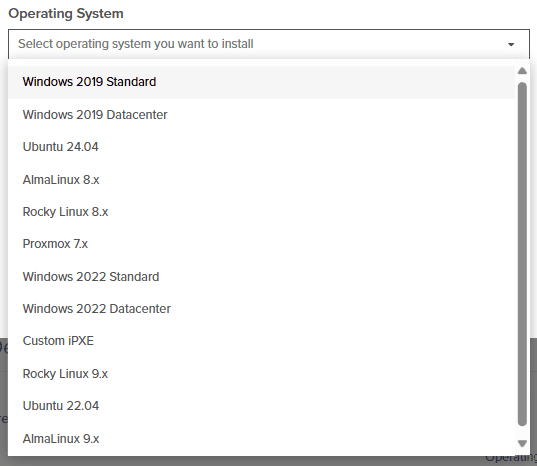An operating system is a software that manages the hardware and software resources of a computer. It provides a common interface for applications to interact with the hardware, and performs tasks such as memory management, process scheduling, file system management, security, and networking. Some examples of popular operating systems are Windows, Linux, macOS.
You can load most OSs on your dedicated server through the custom ISO feature in the customer portal, but Hivelocity also offers a wide selection of ready-to-install operating systems. Below, you’ll find a brief overview of each to help you choose the right one for your server.
Key Differences Between Custom Dedicated Servers and Instant Dedicated Servers
Both custom and instant dedicated servers let you choose your OS, but the setup process differs. With custom dedicated servers, reload requests generate a form for the Support team to handle, while instant dedicated servers use an automated system to install from a precompiled OS list.
Offered Operating Systems
The image below displays the currently available operating systems to choose from when reloading your instant dedicated server. Note that the offered items on the list can change at any time.
Non-instant dedicated servers do not have automation for OS installation as such however are able to request these OSs in the reload form on their device page.

Pros and Cons of Each OS offered With Your Dedicated Server
Windows Server 2019 (Standard & Datacenter)
Windows Server 2019 provides a reliable platform for enterprise applications, Active Directory, file sharing, and virtualization. The Standard edition suits small to medium deployments with limited virtualization, while the Datacenter edition supports large datacenters with unlimited virtualization and advanced features.
- Pros: Stable and widely supported; great compatibility with enterprise applications; strong Active Directory and Windows ecosystem integration; Datacenter edition provides unlimited virtualization.
- Cons: Heavier on system resources compared to Linux; Datacenter edition may be overkill for smaller environments.
Windows Server 2022 (Standard & Datacenter)
Windows Server 2022 is Microsoft’s latest server platform, offering improved security, modern networking, and hybrid cloud integration with Azure. The Standard edition suits small to medium workloads with limited virtualization, while the Datacenter edition offers unlimited virtualization and advanced features for large-scale deployments.
- Pros: Enhanced security (Secured-core server, TLS 1.3, improved encryption); strong support for containers and hybrid cloud; long support lifecycle; Datacenter edition enables unlimited VMs and advanced features.
-
Cons: Resource-intensive compared to Linux alternatives; Datacenter edition is unnecessary unless running large, highly virtualized environments.
Ubuntu Server (22.04 & 24.04 LTS)
Ubuntu is one of the most popular Linux distributions, widely used for web servers, cloud deployments, and containerized applications. Both 22.04 LTS (Jammy Jellyfish) and 24.04 LTS (Noble Numbat) are Long-Term Support releases, but they serve slightly different needs. Ubuntu 22.04 is proven and highly stable in production, while Ubuntu 24.04 adds updated kernels, modern packages, and performance optimizations for cloud-native workloads.
- Pros: Huge community and vendor support; excellent for cloud and DevOps workflows; frequent security updates; 22.04 offers rock-solid stability, while 24.04 provides the newest features and longer future support.
-
Cons: Heavier resource usage compared to minimal distributions; 22.04 is slightly older with outdated packages, while 24.04 may not yet have full compatibility with all enterprise applications.
AlmaLinux (8.x & 9.x)
AlmaLinux is a free, community-driven, enterprise-grade Linux distribution that serves as a drop-in replacement for Red Hat Enterprise Linux (RHEL) and was created to fill the gap left by CentOS’s shift to CentOS Stream. Version 8.x offers proven stability and long-term support, making it a dependable choice for enterprises that value reliability. AlmaLinux 9.x builds on that foundation with a modern software stack, updated kernel, and improved security features, making it suitable for newer workloads and future-proof deployments.
- Pros: Fully RHEL-compatible; enterprise-ready; long support lifecycle; strong community and commercial backing; 8.x is stable and time-tested, while 9.x is modern and secure.
-
Cons: Older 8.x branch lacks the latest software; 9.x may pose compatibility issues for legacy applications.
Rocky Linux (8.x & 9.x)
Rocky Linux, created by CentOS’s original founder, continues the mission of providing a stable, RHEL-compatible enterprise platform. Version 8.x serves as a trusted CentOS successor, while 9.x delivers a modern base with updated kernels, libraries, and stronger security.
- Pros: Community-driven; fully RHEL-compatible; widely trusted by enterprises; predictable updates; 8.x is highly stable, while 9.x offers a modern stack and longer support.
-
Cons: 8.x is aging with older packages; 9.x, though modern, may face some adoption hurdles for older enterprise software.
Proxmox 7.x
Proxmox Virtual Environment (VE) 7.x is an open-source virtualization and container platform. It combines KVM for virtual machines and LXC for containers, along with integrated backup and clustering features. It’s commonly used as a cost-effective alternative to VMware.
- Pros: Free and open-source; built-in clustering and backup tools; integrates Ceph for storage; excellent for homelabs and enterprises alike.
-
Cons: Smaller ecosystem compared to VMware/Hyper-V; steeper learning curve for newcomers.
Custom iPXE
Custom iPXE allows booting systems over the network with a lightweight bootloader. Organizations typically use this option for custom OS installations, PXE provisioning, or highly automated deployments.
- Pros: Extremely flexible; useful for custom setups or automated provisioning; avoids reliance on local media.
-
Cons: Requires technical expertise; not suitable for beginners or small, simple deployments.
Further Assistance and Other OSs
Alternative operating system can be installed on the servers. For assistance with installing such systems or any other aspects presented in this article, please reach out to the Hivelocity Support team via a chat, support ticket, or phone at 888-869-4678.
– by Pascal Suissa